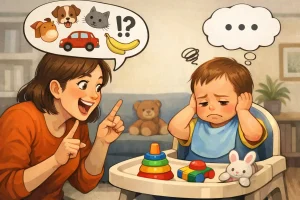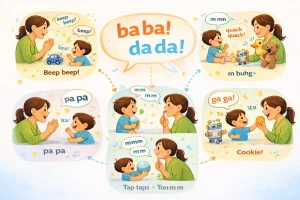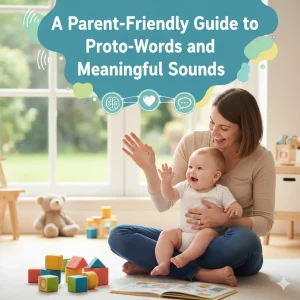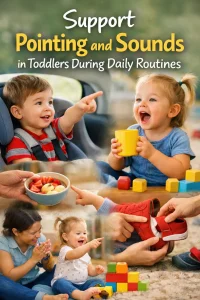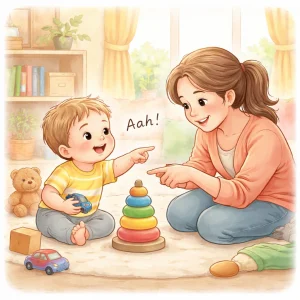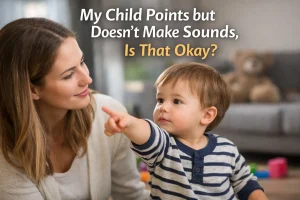Early Signs Your Preschooler May Need a Speech Evaluation
Last Updated: October 6, 2025
Is your preschooler’s speech sometimes hard to understand, or do you wonder if they’re hitting the right milestones? Many parents ask themselves, “Does my child need a speech evaluation?” The truth is, while some kids are simply “late talkers,” others may show early signs of a speech delay that should not be ignored.
At ages 3 and 4, clear communication is a key part of learning, playing, and making friends. If your child struggles with unclear speech, limited vocabulary, or stuttering, it might be time to look closer. Knowing the early signs of speech delay in preschoolers can help you decide when to seek a speech evaluation from a licensed speech-language pathologist (SLP).
In this guide, we’ll walk you through normal milestones, red flags, common causes, and what actually happens during a speech therapy evaluation—so you feel informed, reassured, and ready to support your child’s communication journey.
Why Early Speech Evaluation Matters
A speech therapy evaluation is more than just checking how clearly a child talks. It is the first step in understanding how your preschooler is developing language, communication, and social skills. Many parents wait, hoping their child will “catch up,” but research shows that early action makes a big difference.
Between the ages of 3 and 5, a child’s brain has remarkable plasticity—it is highly flexible and ready to learn new skills. This means that challenges like a speech delay in preschoolers can often be addressed more effectively during these years. The earlier a speech-language pathologist identifies the issue, the sooner targeted strategies can help.
Early intervention does more than improve speech clarity. It helps prevent future struggles with reading, learning, and social interaction. Children who receive support early often build stronger confidence, communicate more effectively with peers, and adapt better in school.
In short, an early speech evaluation not only identifies concerns but also creates opportunities. It allows your child to access therapy at the stage when their brain is most open to change—giving them the best chance to thrive academically and socially.
Normal Speech Milestones at Ages 3 and 4
Understanding speech milestones helps parents know whether their child is on track or showing early signs of a delay. Every child develops at their own pace, but there are certain skills most preschoolers should master by age 3 and 4. These benchmarks give a clear picture of speech intelligibility (how well others can understand your child) and highlight whether extra support may be needed.
Speech Milestones at 3 Years
By the age of three, most children:
- Use 2–3 word phrases such as “want juice” or “go park.”
- Have a vocabulary of around 200–500 words.
- Can name familiar objects, people, and simple actions.
- Are understood by family members most of the time, and by strangers about 75% of the time.
At this stage, it’s common for children to show normal phonological processes—for example, saying “tat” instead of “cat” (fronting) or “wabbit” instead of “rabbit” (gliding). These patterns are part of learning, but they should begin to fade as speech develops
Speech Milestones at 4 Years
By age four, most children:
- Speak in 4–5 word sentences like “I want to play outside” or “We saw a big dog.”
- Ask and answer simple questions.
- Tell short stories or describe events with more detail.
- Are 90–100% intelligible to strangers, meaning people outside the family can usually understand them.
- Show clearer articulation, with fewer sound errors, though some tricky sounds like “r” or “th” may still be developing.
At this stage, continued phonological processes or frequent unintelligible speech may be a sign that a speech therapy evaluation is needed.
Red Flags That May Signal a Speech Delay
Every child develops differently, but there are some clear red flags that may point to a speech delay in preschoolers. While it’s normal for young children to make mistakes as they learn, certain patterns—especially if they persist—should not be ignored. Recognizing these signs early helps parents decide when to get a speech evaluation from a licensed speech-language pathologist.
Some common warning signs include:
- Not combining words by 3 years – If your child is still using only single words and not forming short phrases like “want toy” or “go park,” this may be a sign of delay.
- Hard to understand by strangers at 4 – By age four, children should be mostly intelligible. If strangers often struggle to understand your child, it may point to unclear speech in 4-year-olds that needs attention.
- Frequent frustration due to communication breakdown – Kids who know what they want but cannot express it may cry, get upset, or avoid talking. This emotional reaction is often linked to speech or language struggles.
- Stuttering that doesn’t resolve – It’s common for preschoolers to repeat sounds or words as their language grows. But if stuttering is persistent or worsening, it’s worth seeking guidance.
- Limited vocabulary growth – A 3- or 4-year-old should be learning new words daily. Slow progress or very restricted vocabulary may be a red flag.
- Regression of language skills – If a child who previously spoke in sentences suddenly loses skills or stops using words, it can be a serious concern that requires immediate evaluation.
Spotting these late talker signs doesn’t always mean there is a long-term problem—but they do signal the need for closer monitoring. Acting early ensures your child gets the support they need at the right time.
Common Causes Behind Preschool Speech Delays
When parents notice that their preschooler is not speaking clearly or is behind in milestones, the first question is often “Why is this happening?” The truth is, speech delays in preschoolers can have many different causes. Some are temporary and easily resolved, while others may need ongoing support from a speech-language pathologist. Understanding the most common reasons can help you decide when to seek help.
Hearing Problems and Speech Delay
One of the most overlooked causes of delayed speech is hearing loss. Even frequent ear infections can affect how a child hears sounds, making it hard for them to imitate words correctly. If children cannot hear certain sounds clearly, they may struggle with speech intelligibility and fall behind in language development.
Expressive vs. Receptive Language Delay
Some children understand language (receptive skills) but have trouble speaking (expressive skills). This is called an expressive language delay. Others may have difficulty understanding instructions, questions, or stories—this is a receptive language delay. Both types impact how a child communicates and may require a speech therapy evaluation to identify the difference and guide treatment.
Oral-Motor Weaknesses
Children need strong muscles in the lips, tongue, and jaw to form words clearly. Weaknesses in these areas can cause articulation errors and patterns known as phonological processes—such as saying “tat” for “cat” (fronting), “wabbit” for “rabbit” (gliding), or leaving sounds out completely (stopping). If these patterns continue past the typical age, they may signal the need for therapy.
Autism Spectrum Disorder or Developmental Delays
Speech delays are also common in children with autism spectrum disorder or other developmental conditions. In these cases, speech challenges are often linked to difficulties with social communication, eye contact, or play skills. Identifying these early can ensure children get the right combination of therapies.
Bilingualism Myths vs. Reality
Many parents worry that raising a child with two languages causes speech delay. The reality is, bilingualism does not cause speech problems. Children may mix words from both languages at first, but this is a normal stage. If a bilingual child shows delays in both languages, however, it may be a sign of an underlying speech or language disorder rather than exposure to multiple languages.
In summary, causes of speech delay can range from simple issues like hearing problems to more complex conditions like childhood apraxia of speech signs or autism. The good news is that a professional evaluation can uncover the cause and guide parents toward the right support.
When to Seek a Speech Evaluation
Many parents wonder, “When should a preschooler get a speech evaluation?” The simple answer is: if your child is missing major speech milestones by more than six months, it’s time to consult a professional. Early action makes a big difference because the preschool years are the most critical for language development.
For example, if your 3-year-old is still not combining words, or if your 4-year-old is hard to understand for strangers, don’t wait and hope they will “grow out of it.” A pediatric speech therapist evaluation can determine whether your child is just a late bloomer or if they need structured support.
Who to Consult First?
Parents are often unsure whether to go to the pediatrician, ENT, or SLP. Here’s how they differ:
- Pediatrician – Your first stop. They will check overall development and may refer you for further testing.
- ENT (Ear, Nose, and Throat Specialist) – If there are concerns about hearing loss, chronic ear infections, or physical issues affecting speech. Since hearing problems and speech delay are closely linked, an ENT check is important when ear issues are suspected.
- Speech-Language Pathologist (SLP) – The expert in communication and language. An SLP conducts detailed assessments of speech clarity, vocabulary, sentence structure, and social use of language. They create a tailored plan if therapy is needed.
In short, if your preschooler is falling behind in speech or shows ongoing difficulties, don’t delay. A speech therapy evaluation gives you clear answers and, most importantly, helps your child build the confidence to communicate effectively.
What Happens During a Speech Evaluation?
For many parents, scheduling a speech assessment for children can feel overwhelming simply because they don’t know what to expect. The good news is that the process is child-friendly, engaging, and designed to uncover exactly how your preschooler communicates. A typical speech therapy evaluation checklist covers several key steps to make sure no area is missed.
Parent Interview & Case History
The process usually begins with a conversation. The speech-language pathologist (SLP) will ask about your child’s medical history, developmental milestones, daily routines, and your specific concerns. This information helps the therapist understand the bigger picture and tailor the evaluation to your child’s needs.
Observation & Play-Based Testing
Young children learn best through play, so much of the evaluation happens in a relaxed, fun setting. The SLP may watch how your child plays, responds to questions, or interacts with toys. This play-based approach makes it easier to spot speech intelligibility issues, vocabulary gaps, or social communication difficulties.
Formal Speech & Language Assessment Tools
In addition to observation, standardized tools are often used to measure skills such as:
- Articulation – how clearly your child can produce sounds.
- Phonological processes – whether patterns like fronting or gliding are still present.
- Receptive language – how well your child understands words and directions.
- Expressive language – how well your child can form phrases, sentences, and share ideas.
These structured tests help identify whether a delay is mild, moderate, or significant.
Hearing Screening and Oral-Motor Exam
Because hearing problems and speech delay are often connected, many evaluations include a basic hearing screening or referral to an audiologist. The SLP will also check the movement and strength of the lips, tongue, and jaw through an oral-motor exam, since these muscles are critical for clear speech.
What Parents Receive After the Evaluation
At the end of the session, the SLP explains their findings in simple terms. You can expect:
- A diagnosis or summary of your child’s speech and language skills.
- An individualized plan with goals tailored to your child’s needs.
- Therapy recommendations, which may include regular sessions, at-home strategies, or referrals to other specialists like an ENT or occupational therapist.
In short, a speech therapy evaluation is not just about testing—it’s about understanding your child’s unique strengths and challenges, and creating a roadmap that supports their growth and confidence in communication.
Helping Your Child at Home Before and After an Evaluation
Even before starting therapy, parents can make a big difference in their child’s progress. Simple, everyday routines can double as opportunities to build language skills. After an evaluation, these same activities can reinforce what the therapist is teaching. By practicing home activities to help speech clarity, you create a supportive environment where your preschooler feels confident and motivated to communicate.
Read Books Daily
Story time is one of the most powerful tools for speech therapy at home. Reading every day exposes children to new words, sentence patterns, and storytelling. Pause to ask questions, point to pictures, and encourage your child to repeat simple words or phrases.
Encourage Pretend Play
Pretend play—like playing “kitchen,” “doctor,” or “shop”—naturally builds conversation skills. It helps children practice turn-taking, vocabulary, and imagination. This kind of role-play also boosts social communication, which is often linked to speech development.
Model Slow, Clear Speech
Children learn best by example. When you talk to your child, use slow, clear speech. Emphasize tricky sounds naturally in conversation rather than overcorrecting. For instance, if your child says “tat” for “cat,” you can gently respond, “Yes, that’s a cat.” This supportive approach improves speech clarity without making your child feel pressured.
Limit Screen Time
Excessive screen time reduces opportunities for real-life conversation and interaction. Keep screens limited, especially for preschoolers, and focus on face-to-face communication. Simple routines—like mealtime chats or walks in the park—are far more effective for language growth.
With these practical home activities to help speech clarity, you’re not only preparing your child for a successful evaluation but also reinforcing their progress afterward. Consistency at home, combined with professional guidance, gives children the best chance to thrive in their communication journey.
Finding a Speech Therapist Near You
If you’ve noticed red flags and are ready to take the next step, the first question is often, “Where can I find speech therapy near me for toddlers?” The good news is that parents today have more options than ever before to access expert help. Whether you’re searching for in-person services or flexible online sessions, getting a speech evaluation appointment is easier than you might think.
Local Speech Therapy Services
Most families begin by asking their pediatrician for a referral to a pediatric speech therapist. Many hospitals, child development centers, and private clinics in cities across the US, India, and other regions offer evaluations and therapy. Adding location-based searches—like “speech therapy in New York” or “speech therapy in Hyderabad”—can connect you to specialists nearby.
Teletherapy Options
In recent years, online speech therapy has become a practical alternative, especially for busy parents or those living in areas without local specialists. Teletherapy allows your child to work with a licensed speech-language pathologist (SLP) through video sessions at home. These virtual appointments are interactive, play-based, and often just as effective as in-person sessions.
Early Intervention Programs
For children under five, many regions offer government-funded early intervention programs. These services provide free or low-cost screenings, evaluations, and therapy for children who qualify. Parents in the US can check their state’s early intervention program, while families in India can connect with child development centers or NGOs focused on early childhood support.
Whether you choose an in-person clinic, a speech evaluation appointment online, or an early intervention program, the most important step is to act early. Finding the right support ensures your child gets timely help, builds confidence, and thrives in their communication journey.
Conclusion
As a parent, it’s natural to feel worried if your preschooler’s speech seems unclear or delayed. The reassuring news is that many children do improve with time, especially when given the right support. Still, waiting too long can sometimes mean missed opportunities. Early therapy is key because the preschool years are when a child’s brain is most ready to learn new skills and adapt quickly.
Trust your instincts—if something feels off, it’s worth checking. A speech evaluation doesn’t mean your child will definitely need long-term therapy, but it does give you clear answers and peace of mind. And if therapy is needed, starting early can make all the difference for your child’s academic success, social confidence, and overall communication skills.
If your child’s speech is unclear, book a speech evaluation with a licensed speech-language pathologist today. Early action is a gift that can open doors for your child’s future.
Frequently Asked Questions:
1. What are the early signs my preschooler may need a speech evaluation?
Early signs include not combining words by age 3, unclear speech at age 4, limited vocabulary growth, or frequent frustration when trying to communicate. Some children may also stutter, lose words they once used, or avoid talking. If you notice these patterns, it’s worth checking with a speech-language pathologist (SLP).
2. Is unclear speech in 4-year-olds normal?
By age 4, most children should be understood by strangers almost all the time. If your child is still very hard to understand, especially outside the family, it may signal a speech delay. Early help can improve speech clarity and make school readiness easier.
3. When should a preschooler get a speech evaluation?
Experts suggest getting a speech evaluation appointment if your child is 6 months or more behind in milestones. For example, if your 3-year-old is not using short phrases or your 4-year-old cannot form clear sentences. The sooner you act, the quicker therapy can help.
4. What happens during a speech therapy evaluation for children?
The therapist will talk to you about your child’s history, observe them in play, and use simple tests to check speech, language, and listening skills. They may also look at articulation, vocabulary, and social communication. A short hearing check or oral exam is often included to rule out medical causes.
5. Can hearing problems cause speech delay in toddlers?
Yes. Frequent ear infections or undiagnosed hearing loss can make it hard for a child to hear sounds clearly. If they cannot hear certain sounds, they may not learn to say them correctly. That’s why hearing screenings are often part of a speech evaluation.
6. What is the difference between expressive and receptive language delay?
- Expressive language delay means the child understands but struggles to put thoughts into words.
- Receptive language delay means the child has trouble understanding instructions, questions, or new words.
Both types may affect learning and social skills, so early therapy is very helpful.
7. Are stuttering and unclear speech always signs of a problem?
Mild stuttering and sound mix-ups are common when children’s language is growing quickly. However, if stuttering continues for several months, worsens, or your child avoids speaking, it should be checked. Unclear speech in 4-year-olds that makes strangers confused is another sign to seek an evaluation.
8. Does being bilingual cause speech delay?
No. Learning two languages does not cause a delay. Bilingual children may mix words from both languages at first, which is completely normal. If your child is struggling in both languages, that may point to another cause, and an SLP can help sort this out.
9. How can I help my child’s speech at home?
Parents can support speech growth every day with simple activities. Read books aloud daily, play pretend games, and model slow, clear speech when talking. Limit screen time and focus on face-to-face conversations, which give children more practice in real-life communication.
10. Where can I find speech therapy near me for toddlers?
You can ask your pediatrician for referrals, search online for speech therapy near me for toddlers, or contact your local early intervention program. Many families also choose online teletherapy, which allows children to connect with a licensed speech therapist from home.
About the Author:
Anuradha Karanam
Speech-language pathologist (7+ years of experience)
Anuradha Karanam is a skilled speech-language pathologist with over 6 years of experience. Fluent in Tamil, Telugu, Hindi, and English, she specializes in parent counseling, speech sound disorders, fluency assessment, and speech-language evaluations. Anuradha excels at working with children with developmental disorders, offering creative and effective therapy programs. Currently, at Wellness Hub, she holds a BASLP degree and is registered with the RCI (CRR No A85500). Her patience, ambition, and dedication make her a trusted expert in her field.
Book your Free Consultation Today
Parent/Caregiver Info:
Client’s Details:
* Error Message
